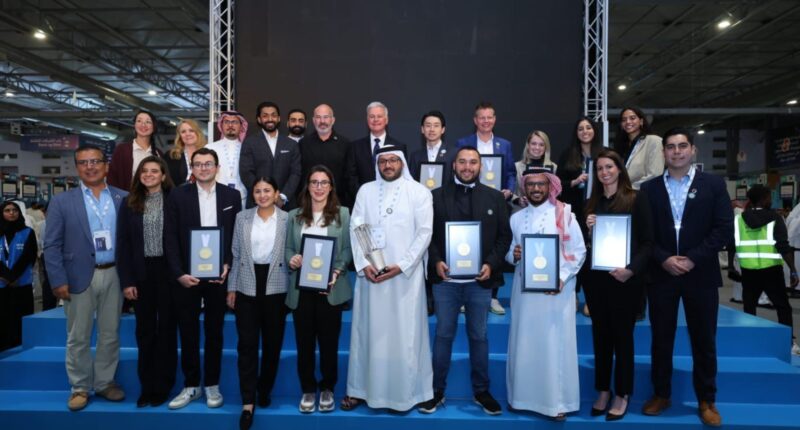You’re reading Entrepreneur Middle East, an international franchise of Entrepreneur Media.
The latest edition of the Entrepreneurship World Cup (EWC) took place in the Kingdom of Saudi Arabia, a nation that has swiftly evolved in recent years to become a hotspot in the MENA region for startups and small and medium-sized enterprises (SMEs).
Bolstered by young demographics, a growing entrepreneurial culture, and government reforms that support the growth of startups, the Global Entrepreneurship Monitor’s (GEM) 2022 National Entrepreneurship Context Index recently ranked Saudi Arabia as the second-best economy in the world to start a business. The combination of these developments made the Kingdom well placed to hold this year’s edition of the EWC.
Co-hosted by the Global Entrepreneurship Network (GEN) and Monsha’at, the Small and Medium Enterprises General Authority of Saudi Arabia, the EWC is one of the largest, most diverse pitch competitions and support programs of its kind. Since its establishment in 2019, it has seen over 400,000 entrepreneurs from 200 countries tenaciously compete for the top spots.
Boasting a diverse showcase of entrepreneurial excellence, the EWC gives the world’s most promising startups the opportunity to win a share of US$1 million dollars in cash prizes, and millions more worth of investment, support, and publicity. Over the years, it has connected founders with more than $4 million in cash prizes and another $266 million worth of free support and services.
The EWC Global Finals were held this year at Biban 23, the Kingdom’s largest SME, entrepreneurship, and startup forum. Providing over 105,000 participants a platform to network, advance entrepreneurship in the Kingdom, and pioneer solutions to global business challenges, the theme of this year’s Biban forum was “Attract-Connect-Achieve,” focused on creating tangible opportunities for new businesses to thrive.
Among its attendees, the forum welcomed 100 up-and-coming startups from 53 countries to compete in the EWC’s final rounds. Aside from vying for the main prize, these businesses also competed in specialized categories that covered a range of disruptive sectors, including tech, space, and sustainability and environment. Impact categories also featured startups that contribute towards social impact, from women-led enterprises to those facilitating the achievement of the Sustainable Development Goals (SDGs).
 Image courtesy Entrepreneurship World Cup.
Image courtesy Entrepreneurship World Cup.
WhiteHelmet, a Saudi-based company that provides a platform to manage and monitor construction operations remotely, was announced as the winner of the grand prize: a $300,000 share of the $1 million prize pot. It was also the first time that a Saudi company emerged victorious at the EWC. Abdullah Abalkhail, founder and CEO of WhiteHelmet said, “We are proud to be the first Saudi company to be ranked first in the world in this major international competition for entrepreneurship. Winning this award is a testament to what startups can achieve through tight teamwork. It also serves as an excellent motivator for us to continue our enabling role in the digital transformation of the construction sector and the realization of Saudi Vision 2030.”
NDR Medical Technology, a Singaporean interventional robotics company that integrates artificial intelligence (AI) and robotics to pioneer image-guided robotic medical procedures, took home the coveted second-place prize of $200,000. Notably, NDR Medical Technology developed the patented Automated Needle Targeting (ANT) system, which can facilitate safe and accurate needle punctures to organs such as the lungs, kidneys, pancreas and spine. Alan Goh, its co-founder and CEO, said, “The potential for robotics to transform the surgical landscape today is massive. New startups and companies joining this exciting, high-growth sector need to think about how robotics can be used to complement the vital work that surgeons do today in hospitals around the world. We see a bright future ahead, one where AI and robotics co-exist with medical staff, elevating their work and what they can accomplish to improve the lives of others.”
The story of Hera Health Solutions, winners of the third prize of $150,000, began with a clear vision from its founders: to improve how the healthcare industry handles drug delivery to the body. As it stands, there are billions spent on the discovery of new drugs, but the drug delivery mechanism to the body of many existing medications are overlooked. Today, once the lifespan of existing drug delivery implants are over, and the drug has been consumed, the implant must be removed through potentially painful removal procedures. Hera Health Solutions is mitigating the risks and costs associated with this process through its nanotechnology-based manufacturing process, which incorporate biodegradable materials that absorbs into the body as the drug or hormone of choice is completely utilized. This patented technology aims to rapidly increase the safety and efficacy of existing long-acting therapeutics.
Following his win, when asked for advice he’d shared with his fellow entrepreneurs, Idicula Mathew, co-founder and CEO of Hera Health Solutions, said, “Having a positive mindset when dealing with challenges is one of the keys to launching and scaling a successful startup. Be sure to incorporate valuable feedback from the experts in the space on how to effectively scale your technology. Believe in your idea, listen to the feedback, and evolve until you succeed. As we look to expand our drug delivery platform, we are excited about the key global strategic partnerships that we see on the horizon that came as a result of the EWC network.”
The innovative startups from around the world competing in the EWC have the following major traits in common: a desire to disrupt the industries they are a part of, and their willingness to see through big ideas that can change the world. This was true for Marlow, a Canadian startup founded by four women that secured an impressive fourth place at the EWC. As a fast-growing menstrual health brand, Marlow has created the first-ever lubricated tampon. The company’s co-founder and CEO, Nadia Ladak, credited her and her team’s mindset for the successes it had seen so far. “In addition to boundless optimism, starting a successful business requires a mindset that doesn’t accept the status quo,” Ladak said. “Doing things differently -and thinking differently- is what ultimately drives entrepreneurs to develop businesses that transform the way we live. Believing in your idea is also paramount, as is having the resilience to break through the walls you will inevitably be faced with… A mentor once told me, ‘Entrepreneurship is like jumping off a cliff, and trying to build the airplane on the way down.’ From my own experience in co-founding Marlow, that rings very true!”
Related: Saudi Arabia’s Biban 2023 Forum Shows The Kingdom’s Commitment To Become A Leading SME Hub








